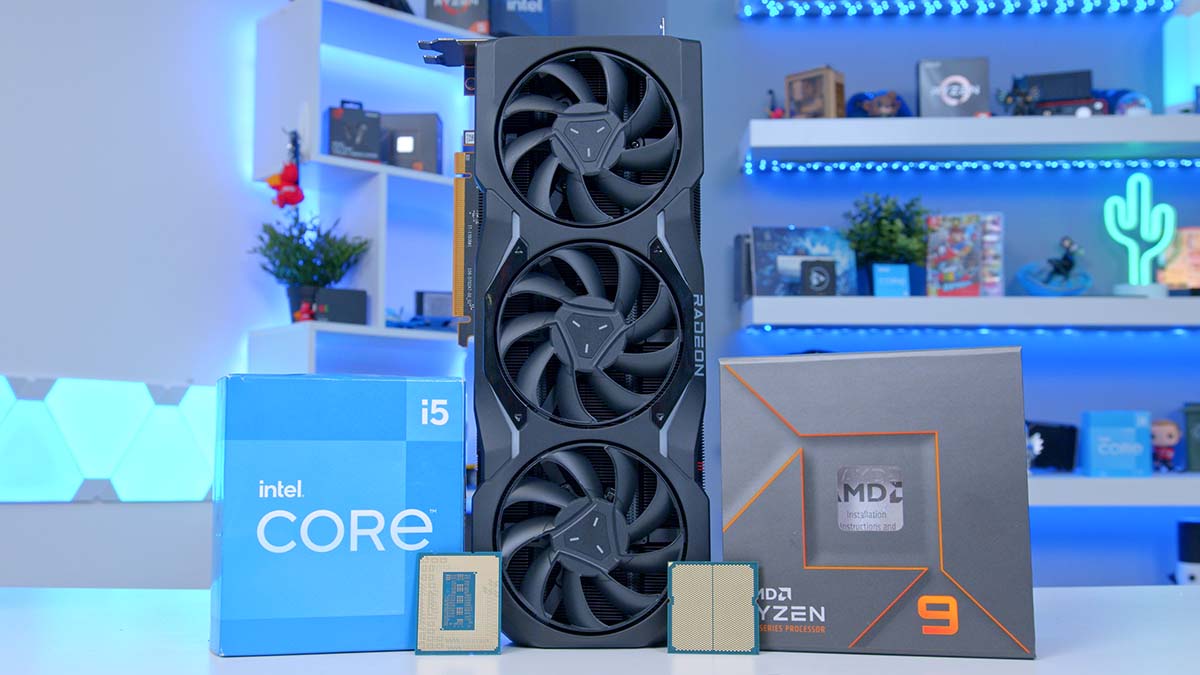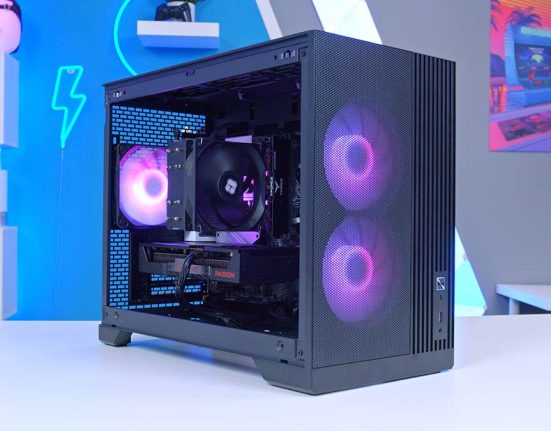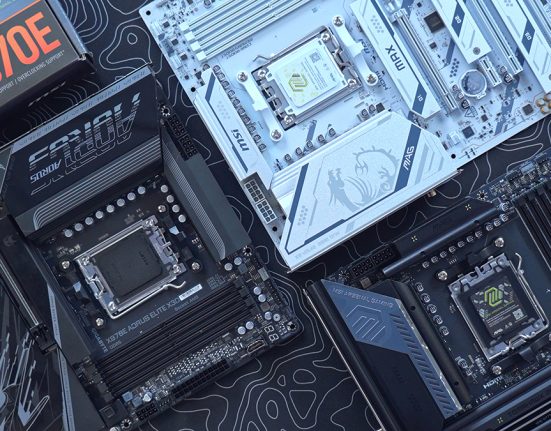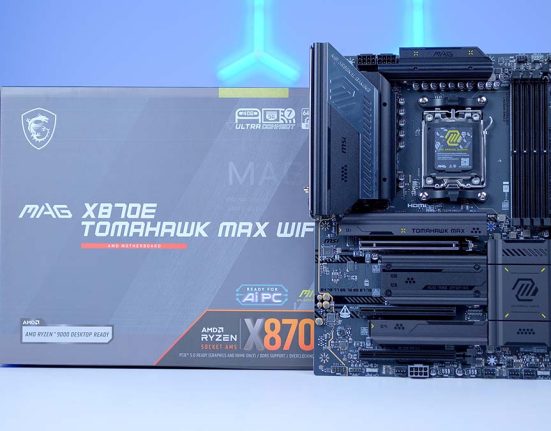Introduction
Here we are, back again from another launch. After an endless slew of launches including graphics cards, motherboards, CPUs and a whole host of components. We had a brief reprieve from the chaos of benchmarking, but now we’ve been thrown back into the fray with some new graphics cards. However, instead of the renowned Green logo that you’re probably expecting, we’re seeing a launch from AMD.
After the somewhat mediocre release of the Ryzen 7000 launch consumers were left dismayed with the exorbitant platform price of these new AM5 processors. However, AMD seem to be a a ‘shimmer of hope’ in an Nvidia dominated market, as the new Radeon 7000 cards are set to bring excellent performance at a very competitive price compared to the RTX 4080 and 4090.
If you’re looking for a full coverage of the performance of the new AMD Radeon cards, we recommend you go and check out our in-depth review on each of the new cards. However, if you’re wondering what CPUs would pair well with the brand new cards, then stick around! In this article we’re putting together a roundup of the best CPUs to pair with AMD’s brand new Radeon RX 7900XTX graphics card, so you can build the best value for money and performance PC build!
Suggested Article: Best Liquid CPU Coolers to Buy Under $300
Best CPUs for the AMD Radeon RX 7900XTX
1. Intel Core i5 13600K
????The best budget CPU.

Introduction
Starting off this roundup, we’ve picked out Intel’s Core i5 13600K as the best budget option to pair with the RX 7900XTX. Normally we would have picked primarily AMD options for Smart Access Memory, but the 7600X just doesn’t compare very well to the 13600K, making it a better choice for those looking to build a more price conscious system. But despite this CPU being our ‘budget’ option, its performance is far from that, offering excellent multi and single threaded metrics in most applications.
The reason this CPU sits at the top of our list is due to its exceptional core and thread count, alongside very impressive clock speeds. The 13600K will be ideal for games due to its high boost clock speed, and can be used as a low-end workstation CPU if you’re putting it through lighter workloads. You also get the added benefit of building a relatively cheap system overall due to the plethora of motherboard choices, along with the option of DDR4 or DDR5 RAM. Overall, the 13600K is a perfect choice for those trying to save some money when building a system.
Key Specs
| Key Specs | Intel Core i5 13600K |
|---|---|
| Core Count | 14 |
| Thread Count | 20 |
| Base Clock Speed | 3.5GHz |
| Boost Clock Speed | 5.1GHz |
| Max Turbo Power | 181W |
| Overclockable | Yes |
Things We Like
Excellent performance metrics: Intel’s Core i5 13600K is one of the best CPUs that has released in the past year. Consumers can expect performance metrics comparable to a Core i9 12900K, making it perfect for a top-end gaming machine.
Exceptional price point: Alongside the great performance metrics, is the awesome price tag. Intel released the new 13th-Gen CPUs at a similar price point to their 12th-Gen counterparts, making them perfect for those on a budget.
Things We Don’t Like
Platform will be deprecated: Intel’s 13th-Gen CPUs are likely to be the last entrant on the LGA 1700 socket. This means for consumers looking to upgrade to the potential 14th-Gen, you’ll need a brand new motherboard and CPU.
Not ideal for workstations: Although the gaming performance is comparable to a Core i9 12900K, multithreaded performance isn’t as strong. If you’re looking to push your CPU to the max, you’ll want to look at other processors with higher core and thread counts.
Summary
Intel’s Core i5 13600K is one of the best CPUs that you can buy right now. The 13600K is designed to be put into a top-end gaming PC, at an affordable price point. Its thermals are great, the pricing is great, and I feel many consumers won’t be disappointed in the metrics that this processor can offer.
Features: 4/5
Thermals: 4.5/5
Performance: 4.5/5
Value for Money: 4/5
Pros
- Very well priced.
- Excellent single core metrics.
- Perfect for a top-end mid-range system.
Cons
- Can experience bottlenecking at maxed out settings.
- Not built for complex multi-core workstation applications.
Where to Buy
Buy the Intel Core i5 13600K on:
[adrotate banner=”7″]2. AMD Ryzen 7 5800X3D
????The best gaming CPU.

Introduction
AMD’s Ryzen 7 5800X3D still remains to be one of the best gaming CPUs that money can buy. AMD’s 3D V-Cache technology increases the performance in a massive range of games giving you access to more frames. The 5800X3D still sits on par with Intel’s top-end 12th-Gen range making it ideal for those looking purely for a gaming CPU. The 5800X3D still holds up really well today, and is perfect for those that just want to build a 4K gaming system, but there are some minor caveats to this particular SKU.
The AM4 platform is now deprecated and has no further upgradeability beyond the Ryzen 5000 range. But despite this, the AM4 platform is still a worthy choice for those looking to build a mid-range or high-end system. The other major downside to the 5800X3D is that it doesn’t hold up well when it comes to workstation applications. You’d be better off picking up a CPU like the 5900X, or the aforementioned 13600K if you’re looking for a CPU that can handle gaming and other applications. But even with this downside, the 5800X3D is still a worthwhile pickup for the frame increase while gaming!
Key Specs
| Key Specs | AMD Ryzen 7 5800X3D |
|---|---|
| Core Count | 8 |
| Thread Count | 16 |
| Base Clock Speed | 3.4GHz |
| Boost Clock Speed | 4.5GHz |
| Max Turbo Power | 105W |
| Overclockable | No |
Things We Like
Perfect for top-end gaming: The Ryzen 7 5800X3D is a bit of an underdog CPU, and offers incredible performance in modern gaming titles. The 3D V-Cache makes games run much faster comparative to other options, unlocking extra levels of performance most won’t have seen.
Pretty well priced: Due to being a slightly older option, the 5800X3D is fairly cheap and aligns quite well with modern prices. The price will only drop further after the release of the Ryzen 7000 SKU in April 2023.
Things We Don’t Like
Ryzen 5000 is deprecated: Unfortunately if you want to upgrade beyond Ryzen 5000 you’ll need to pick up an entirely new motherboard, CPU, and maybe even RAM, as the AM4 platform has become deprecated due to the release of Ryzen 7000.
Not good for workstation systems: Much like the Core i5 13600K, if you’re looking to build a multifaceted system, the 5800X3D is not an ideal candidate to do it with. There are better options with higher core counts, threads, and clock speeds that will be more useful in a workstation PC.
Summary
AMD’s Ryzen 7 5800X3D is an underdog CPU offering incredible performance in modern games at high resolutions. It isn’t ideal as a workstation processor, but I believe considering the price, most consumers will be happy with just utilising this processor as a gaming-only option.
Features: 4/5
Thermals: 4.5/5
Performance: 4/5
Value for Money: 3.8/5
Pros
- Excellent price.
- Much cheaper motherboard options.
- Ideal for 4K gaming.
Cons
- Not great for workstation applications compared to other options.
- Using a deprecated platform.
Where to Buy
Buy the AMD Ryzen 7 5800X3D on:
[adrotate banner=”12″]3. Intel Core i7 13700K
????The all-rounder CPU.

Introduction
Intel’s Core i7 13700K is likely one of the best options if you’re looking for a CPU that can offer a ‘middle of the road’ approach. The 13700K impressed us highly during the Intel 13th-Gen launch, because it was able to offer performance similar to and above the Core i9 12900K. This makes the 13700K perfect for those building a multifaceted system. If you’re looking to play some games at high settings after you’ve finished doing some 3D Rendering or even video editing, the 13700K is a CPU that can cope with both of these.
I’d go as far to say that the 13700K is probably the best processor to pair with AMD’s new GPUs. You’re getting access to a high-end CPU at a mid-range price that offers incredible performance in games and productivity applications. There are few CPUs that can hold a candle to the performance of the 13700K making it unique and ideal for those trying to build a high performing system for a very reasonable price.
Key Specs
| Key Specs | Intel Core i7 13700K |
|---|---|
| Core Count | 16 |
| Thread Count | 24 |
| Base Clock Speed | 3.4GHz |
| Boost Clock Speed | 5.4GHz |
| Max Turbo Power | 253W |
| Overclockable | Yes |
Things We Like
Perfect for gaming and workstations: Intel’s Core i7 13700K is one of the best multifaceted CPUs due to its higher core count and incredible clock speed. Definitely a winner for those looking to build a PC with multiple uses.
Ideal for 4K games: The 13700K is a CPU with an insane clock speed, where users can see speeds ramp up to 5.4GHz at high utilisation. This makes it ideal for 4K gaming, as all of the GPU data can be processed at a much quicker speed.
Things We Don’t Like
A pricier option: Although the Core i7 13700K is sitting at a mostly competitive price, consumers will have to spend a little bit more to secure this CPU, at its improved hardware makes it highly sought after.
A stronger cooler is required: Intel’s Core i7 13700K is ideal for a top-end system, but for this reason, the majority of users will need to purchase a good CPU cooler in order to offset the higher thermals.
Summary
Intel’s Core i7 13700K remains to be one of the best CPUs to buy if you’re looking to build a PC for productivity during the day, and gaming during the evening. It is a pricier option, but that’s the small caveat to picking up this incredible processor.
Features: 4/5
Thermals: 4/5
Performance: 4.5/5
Value for Money: 4/5
Pros
- Incredible single and multithreaded metrics.
- Ideal for 4K gaming.
- Extremely competitive price.
Cons
- Not as powerful as the 13900K or 7950X.
- Will need to pair a decent cooler for the higher thermal output.
Where to Buy
Buy the Intel Core i7 13700K on:
[adrotate banner=”7″]4. AMD Ryzen 9 7950X
????The high-end CPU.

Introduction
For our last CPU choice we’ve picked out one of AMD’s latest processors from their Ryzen 7000 range – the Ryzen 9 7950X. Although the Ryzen 7000 SKUs were somewhat underwhelming, this was common at the mid-range level. Although the 7600X and 7700X aren’t great compared to their Intel counterparts, the 7900X and 7950X are very good at pretty much everything. The 7950X sits at the top of the leaderboards most of the time and offers alike performance to the Core i9 13900K from Intel.
The reason we’ve picked out the 7950X over the Core i9 13900K is due to platform longevity. Needless to say, the 7950X offers incredible single and multithreaded performance, making it a worthwhile purchase for those building a high-end system. The advantage it has over Intel is that the AM5 platform is going to be supported for years to come, but Intel’s 13th-Gen range will become deprecated in the next year or so. This makes the 7950X a better pick over the 13900K because you’ll have the ability to upgrade with relative ease. Although this CPU (and the platform) has a significant cost for entry, you won’t be disappointed with the performance!
Key Specs
| Key Specs | AMD Ryzen 9 7950X |
|---|---|
| Core Count | 16 |
| Thread Count | 32 |
| Base Clock Speed | 4.5GHz |
| Boost Clock Speed | 5.7GHz |
| Max Turbo Power | 170W |
| Overclockable | Yes |
Things We Like
Incredible metrics across the board: AMD’s Ryzen 9 7950X is one of the best high performance CPUs that consumers can get a hold of right now. This CPU can handle anything you throw at it, whether it’s top-end gaming, or high intensity workstation applications.
Fully overclockable: Ryzen ‘X’ processors have a fully unlocked core multipliers allowing consumers to overclock their CPU to their heart’s content. If you’re looking to unlock some extra performance, we’d definitely recommend pushing up the clock speed on the 7950X.
Things We Don’t Like
Very expensive: As you can probably imagine, a CPU this capable with great performance metrics is likely going to be expensive – and you’d be right. The 7950X is definitely not geared towards the budget end of the spectrum.
Runs insanely hot: The biggest caveat to Ryzen 7000 CPUs is that their boosting behaviour makes them run very hot. If you plan on pushing your CPU up to 100% utilisation, or you’re overclocking, you’ll want to pick up a solid liquid cooler to ensure thermals sit at a reasonable level.
Summary
AMD’s Ryzen 9 7950X is one of the most powerful CPUs that you can buy right now besides Intel’s Core i9 13900K. This CPU is designed for the highest performing top-end systems, whether you’re gaming or using productivity applications the 7950X is designed to handle it.
Features: 4/5
Thermals: 3.7/5
Performance: 5/5
Value for Money: 4/5
Pros
- One of the most powerful CPUs to date.
- Can handle high-end gaming and productivity with ease.
- Platform provides easy upgrades and longevity.
Cons
- Significant cost to gain access to this platform.
- Will need a high-end liquid AIO to offset thermals.
Where to Buy
Buy the AMD Ryzen 9 7950X on:
Is Your CPU Choice Important?
Choosing a CPU to pair with your GPU is a vital decision, because the two components work so closely together. If you CPU isn’t able to keep up with your graphics card, you will experience something known as ‘bottlenecking’. Bottlenecking is a term that describes when your PC isn’t able to keep up with the demand of data. This is can be caused by a flaw in your operating system, or in many cases – mismatched components.

Having a CPU that can’t cope with the speed of your graphics cards essentially means that video output and performance will suffer a delay. This can ultimately result in less frames, but in a worst case scenario, may cause stuttering, tearing, and even system crashes. Although this isn’t necessarily common with modern components based on how powerful they are, you can force a bottleneck by picking a low-end CPU and pairing it with a high-end GPU like the 7900XT or XTX.
Aside from bottlenecking, picking a CPU that pairs well with your graphics card is vital in ensuring that your performance remains consistent and solid. As most games are single threaded you’ll want a processor that holds strong when it comes to single threaded performance. This ensures you’ll get the most amount of frames within your favourite titles, and other less intensive workloads too.
[adrotate banner=”7″]Intel vs AMD
The Team Blue vs Team Red argument is always a major point of contention in the PC gaming space, and it ultimately boils down to preference. Both AMD and Intel win in certain key factors, but choosing one manufacturer will be determined by what you’re looking for as a consumer. Intel 13th-Gen and Ryzen 7000 both have their benefits, but you may find better price to performance in an older option such as Intel 12th-Gen or a Ryzen 5000 SKU.
Intel CPUs

Intel’s latest CPUs have constantly been hitting the mark when it comes to performance. Both 12th and 13th-Gen CPUs are excellent for consumers that are looking for the next best option. But the major caveat to this platform is that Intel is likely to discontinue its usage in the next year. Intel, platforms only tend to survive two generations and then they get put aside for the latest innovation. But despite this downside, Intel’s CPUs are great performers and are ideal for workstation systems, and gaming CPUs.
AMD CPUs

AMD used to be the metaphorical ‘king of the castle’ before Intel launched their 12th-Gen range. Ryzen 5000 CPUs were excellent in terms of their performance offering. Although the Ryzen 7000 launch didn’t quite receive the same level of excitement due to the obscene platform cost, the newest range will pay dividends over time. Ryzen 7000 CPUs are going to be supported, and remain on the same platform for the next few years making it future proof. And as DDR5 starts to become the new memory standard it makes sense to jump on this platform relatively soon.
Platform Cost & Longevity
Before we jump into the recommendations, its worth briefly discussing platform cost which will aid in making a decision on whether to pick Intel or AMD. Building an extremely cheap PC seems to be a thing of the past with rising component costs. But picking a particular platform will help in keeping your overall build cost lower. If you’re looking to be more price conscious about your components we’d recommend sticking to Intel’s side of the fence. Although 12th and 13th-Gen motherboards can incur some cost, you have a wider set of options when it comes to picking motherboards and RAM, making your overall build cost cheaper.
On the AMD side, it becomes slightly complicated for Ryzen 7000 users. There is a bit of a barrier to entry for the AM5 platform that comes in the form of pricing. Motherboards and RAM are not cheap, so you’re total build cost will be significantly higher than what it would be if you were to choose Intel. But the major benefit to picking up a Ryzen 7000 CPU is that the platform won’t be discontinued for a number of years.
Much like the original AM4 platform, AMD tends to extend their support for AM5 products for quite a few years, giving users the ability to upgrade to a more relevant CPU and motherboard should they want to. With Intel 12th and 13th-Gen, this isn’t really an option. Intel’s 13th-Gen range is likely to be deprecated within the next year or so, so you’ll need to pick up an entirely new motherboard and CPU if you’re thinking about upgrading to a potential 14th-Gen range. Regardless, ensuring you open upgrade paths combined with finding a cost that you’re comfortable with is vital in choosing a CPU that is right for you!
How We Picked the Best CPUs for the RX 7900 XTX
To find the best CPUs for the RX 7900 XTX we’ve rounded up numerous options from AMD and Intel‘s latest and older ranges. We’ve compared all of these CPUs in a plethora of workstation and gaming benchmarks to see how they fare against each other. Due to the 7900 XTX sitting towards the top-end of the market, we’ve picked out primarily high-end options, but there are some cheaper choices for those just wanting to play games at 4K!
[adrotate banner=”8″] [adrotate banner=”8″]Conclusion

Best Overall CPU for the Radeon RX 7900 XTX: Intel Core i7 13700K
Intel’s Core i7 13700K is one of the most well-rounded CPUs we’ve had in the office. 4K gaming poses no issue for this top-end titan, and productivity applications also pose no hindrances due to the higher core count and clock speed. Yes this option is pricier compared to a 13600K, or 5800X3D, but we believe the price point sits right in the middle and offers a great balance for those interested in building a multifaceted system.
Read our full Intel Core i7 13700K review, or Buy the Core i7 13700K on Amazon
Frequently Asked Questions

How Many Cores Are Needed for Gaming?
As a general rule, most games will only ever use one core. This means that the majority of consumers can get away with having a CPU that doesn’t have loads of cores. However, clock speed matters, the higher the clock speed, the more frames you’ll get in titles. And often the more cores you have in your CPU, the higher the clock speed will be.

What Motherboard Do I Need to Use?
All of the CPUs that we’ve provided in this roundup will use different boards. To briefly provide some guidance, Intel 13th-Gen CPUs will work on any current Intel boards, and previous generation ones. Ryzen 5000 CPUs use an AM4 socket, and need the previous generation boards, and Ryzen 7000 uses an AM5 socket, so they’ll need the latest motherboards from AMD. We recommend checking out our motherboard compatibility guide for more information.

Do I Need DDR4 or DDR5 RAM?
When it comes to RAM, you’ll need to pick out what is best for you in terms of budget, use-case, and compatibility. Intel 13th-Gen CPUs have the option of DDR4 and DDR5 memory. Ryzen 5000 CPUs only use DDR4 due to the platform being older, and Ryzen 7000 uses DDR5 only.

Do AMD Ryzen 7000 CPUs Work with Older Motherboards?
Unfortunately, Ryzen 7000 processors use an entirely different socket to Ryzen 5000 CPUs, so they are entirely incompatible. Ryzen 7000 is the first generation of AMD’s newest platform, so these motherboards are the only available option.



![FI_[DM89] Phanteks Evolv + AORUS 5090 9850X3D Gallery (8)](https://geekawhat.com/wp-content/uploads/2026/02/FI_DM89-Phanteks-Evolv-AORUS-5090-9850X3D-Gallery-8-551x431.jpg)

![FI_[DM87] HAVN BF & RTX 5090 Build](https://geekawhat.com/wp-content/uploads/2026/01/FI_DM87-HAVN-BF-RTX-5090-Build-551x431.jpg)
![FI_[DM86] Montech King 45 Pro + RX 9070](https://geekawhat.com/wp-content/uploads/2026/01/FI_DM86-Montech-King-45-Pro-RX-9070-551x431.jpg)

